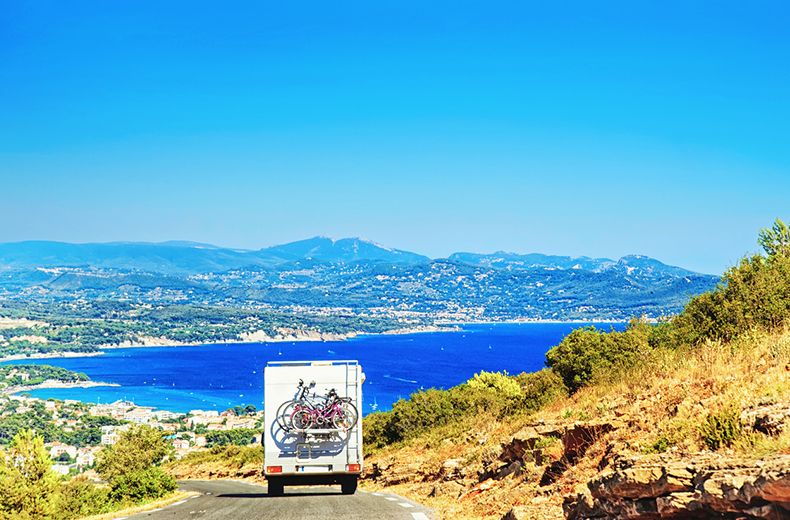From its glamorous Riviera to the sweeping mountains of the Alps and Pyrenees, France has a diverse range of great destinations and brilliant roads that are just waiting to be explored.
However, before you travel in Europe, it is important you're aware of the different motoring rules you’ll need to follow.
To help you out, here’s an overview of the quirkier French motoring rules you might not know about.
French roundabout rules
If you are not used to driving on the right, a roundabout in France can be a little daunting. Here are two golden rules to understanding French roundabouts.
- French roundabouts operate in an anti-clockwise direction
- There are two types of roundabout in France, some will require you to give way to cars that are entering the roundabout
On most roundabouts in France, the standard cédez le passage – give way – is in place. This means that you give way to traffic already on the roundabout or about to join from your left – the same way it works in the UK.
However, there are also a number of roundabouts that will require you to give way to vehicles entering the roundabout even if you’re already on it.
The sign below will tell you there is a roundabout coming up ahead and that you don’t have priority, so you should slow down and be prepared to give way to vehicles joining the roundabout. Don't worry, these roundabouts can feel a little confusing to use at first, but once you have one under your belt, they'll be like second nature.
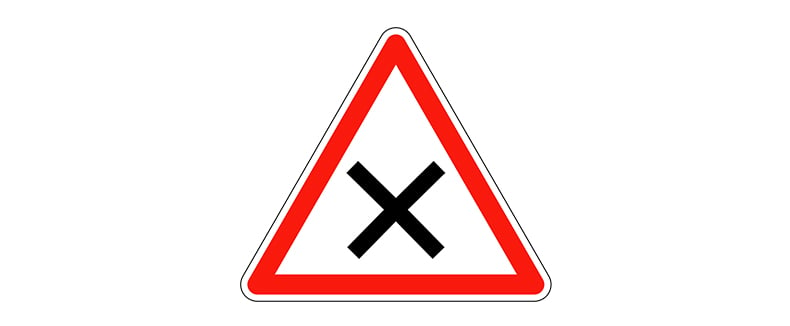
Speed enforcement cameras in France
It is not just speeding motorists that get snapped on France’s roads. The ‘Mesta Fusion’ cameras are also used across the country.
Although they focusing on speed, Mesta Fusion cameras are capable of catching drivers breaking other road rules like tailgating, driving in a bus lane or on the hard shoulder and using a phone behind the wheel.
Breathalysers are not mandatory but recommended for drivers in France
With all that great French beer, wine and cider available it’s tempting to try all the local tipples you can find. But resist the temptation to drink if you know you’re going to be driving, especially if you’re unfamiliar with the local roads.
To stay on the right side of the law, it is recommended to have a portable breathalyser in the vehicle. While you will not face a fine if you don’t have one, it’s a sensible idea to carry one just in case.
Don't use a mobile phone when driving
Mobile phone use is banned in France if you are behind the wheel. The rule applies to all hands-free phones using a headset, bluetooth or wired in a vehicle.
There are large fines - which vary depending on the region - and are heavily enforced by the French police.
Driving in France Kit from £25.99
Did you know you could be fined up to €530 for not carrying the right kit with you in France?
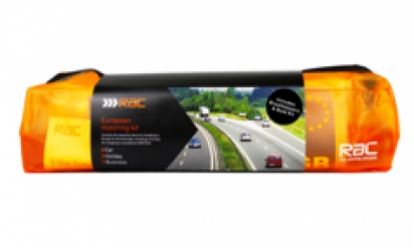

Breakdown fees for French motorways
French motorways are privately owned, which means if you break down on them you’ll have no choice but to use an emergency phone to contact the operator’s recovery team, who’ll tow you to a designated safe area, where you can call the RAC for help.
Because these roads are private you’ll have to pay a fee to get towed. This fee is sometimes even greater depending on the time or day of the week you break down – but don’t worry, if you’ve got RAC European Breakdown Cover you can get this fee reimbursed when back in the UK.
It is illegal for drivers to use headphones in France

Using headphones behind the wheel is actually illegal in France and if you’re caught you could face a fine, so keep your headphones in the glovebox.
Whether you’re bopping along to Phoenix or Sacha Distel’s back-catalogue as you wind through the French campagne, make sure it’s on your car stereo, not through a headset.
- Driving offences abroad – a guide to fines in Europe
- Driving to Disneyland Paris – a complete guide
- 13 driving myths uncovered
Civil enforcement is common in France
As in the UK, France has several local community groups across the country who use speed guns in an attempt to deter motorists from speeding through their local towns and villages. These community groups then hand over their findings to the police, who will contact the registered keepers (drivers).
But, unlike in the UK, the French police can then issue fines or worse on the back of the community reports – so stay on the right side of the law and avoid an unwanted ticket in the post!
Private radar cars
Alongside speed cameras and local community groups with speed guns, following a successful trial in 2018 the French government introduced the use of private radar-enabled cars across the country.
These unmarked cars operated by private companies recorded more than 12,000 speeding offences during a 12-month trial in the northern region of Normandy.
Although we should all be following French speed limits anyway – it’s worth being aware that these extra mobile speed camera vehicles will be on the roads so be especially careful to stick to the speed limits during your trip.
You might need clean air stickers in French cities
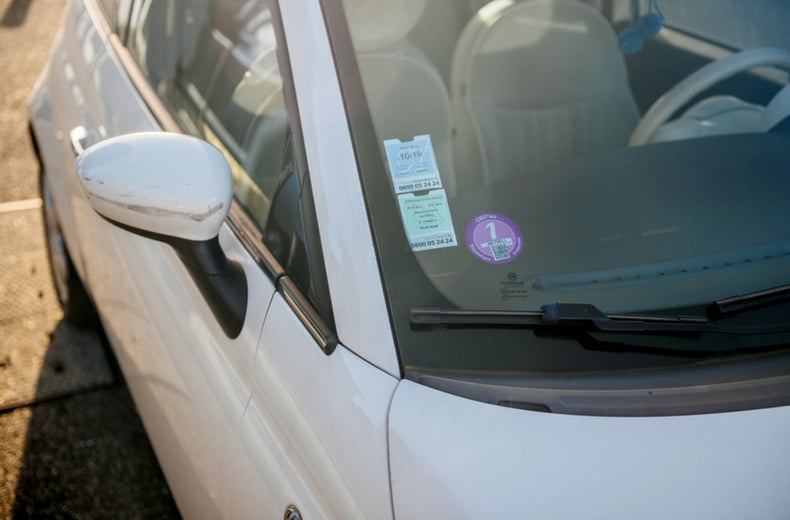
In a bid to tackle air pollution, France has introduced a multi-category sticker system called Crit’Air that identifies a vehicle’s environmental impact. There are six different coloured stickers in total, and each relate to your vehicle’s Euro emissions standards.
Restrictions are based on your vehicle’s Crit’Air sticker, and you face fines for not having one attached to your car at all.
For more information, read our definitive guide to Crit’Air clean air stickers.
Black Saturday is the busiest days on the roads in France
And finally... It’s not a motoring law or anything to do with festive discounts, but you might want to read up on the ominously named ‘Black Saturday’ when planning your trip.
According to the French highways agency, CNIR, ‘Black Saturday’ is shorthand for the few days of the year when roads in France are at their busiest.
These so-called ‘black’ days occur throughout the year and are linked to the holidaying habits of the locals (when French schools break up, for example), but the situation is often exacerbated by motorists from the UK and other EU countries.
It is normally over a few days in July.
Don’t let this stand in the way of your trip! If you can’t avoid travelling on one of these days, there are some great detours you can take. Always check your route ahead of time to avoid the worst of the holiday traffic.

Instant cover available
• 24/7 rescue at the roadside
• Help to get home if your vehicle can't be fixed
• 5 star Defaqto rated cover
*T&Cs apply.

What do I need to remember before driving in France?
Driving on the other side of the Channel is different from driving in the UK, so before grabbing your beret, prepare yourself and your car for France’s driving laws and requirements.
These range from carrying warning triangles and hi-vis vests to Crit’Air clean air stickers, while motorists should also remember that the French drive on the right and have different speed and drink-drive limits to the UK.
The RAC Driving in France kit will help you meet some of these laws, but you should always research the specific requirements for you and your car if driving in another country.
Before heading off on any long journey, it’s always important to carry out some essential maintenance checks at home to ensure your car is tip-top condition and you’ll get to your destination – and back – safely.
The RAC encourages motorists to remember the acronym ‘FORCES’ when carrying out car checks: Fuel, Oil, Rubber, Coolant, Electrics, and Screenwash. Check our tips for avoiding a breakdown for more information on FORCES.
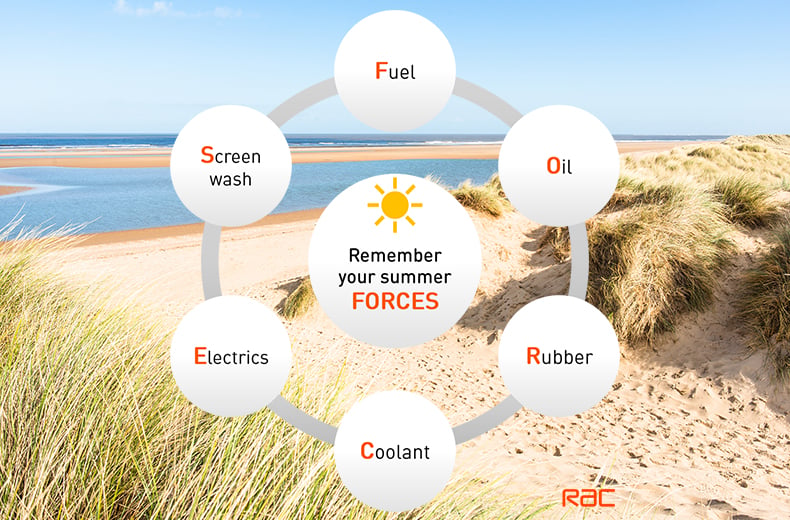
You should also remember to take along a few road trip essentials for the journey, including a first aid kit, additional engine oil and water, a mobile phone charger and snacks and games, especially if you’re travelling with children.
Do I need European breakdown cover to drive in France?
If you’re heading to France, the first thing you need to make sure is that you have breakdown insurance that covers the entirety of your trip.
The RAC has some great value European breakdown cover options that offer comprehensive cover if you break down, offering roadside assistance and a 24/7 English-speaking helpline.
Did you know that we also offer temporary car insurance, if you're borrowing a car to drive to an European destination. You can take out the cover online for up to 30 days. You'll need to select additional cover specifically for Europe as one of the optional extras.
What happens if I break down in France?
Depending on the level of your European breakdown cover, the RAC will pay towards any garage labour costs, onward travel expenses and accommodation fees — something to consider if you’re travelling with your family.
Taking out RAC European breakdown cover will also save you money should your car need repatriating to the UK. Recovery from France could cost you several thousand pounds, but with our Comprehensive Plus cover all costs will be covered as long as your car’s not a write-off.
To find out everything you need to know about breaking down in France, and to get the right quote that meets your needs, check out our complete guide to RAC European breakdown cover in France.
Need cover for the UK leg of your trip? Get complete peace of mind at home or at the roadside with RAC breakdown cover.
Is it illegal to drive without shoes?
Get the answer and more useful driving content sent straight to your inbox.
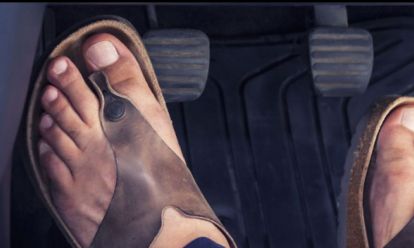


Instant cover available
• 24/7 rescue at the roadside
• Help to get home if your vehicle can't be fixed
• 5 star Defaqto rated cover
*T&Cs apply.


